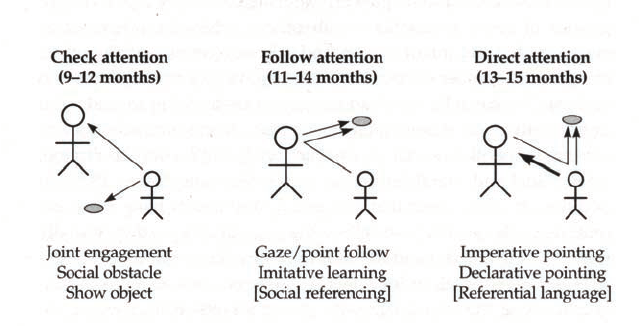Why do children want to show you everything? And what’s it got to do with ancient Israel confession of faith—the Shema?
Like I said yesterday, the prophets of distraction (paying to make you pay attention to what they are selling) are trying to gain, and hold, and direct your attention.
But how do you learn to pay attention in the first place?
Let’s turn to children.
And see what we can learn about childlike faith.
Look! … Come here! … See?
Or, Shared Attention
Like billboards on the freeway, children demand your attention.
Even when they are fed and clothed, they want your attention.
“Look!”
“See…”
“Come here.”
But behind every command for your attention, children are actually asking a question.
“Is this as exciting to you as it is to me?”
“Is this as cool to you as I think it is?”
“Can I touch that furry thing with claws?”
“Is this scary, are is it safe for you and me?”
“Are you still here or did you leave me?”
These questions (in the form of demanding your attention) are asking whether these things are important, have value, are worth the attention the child gave them.
If the caregiver matches the excitement of the toddler, then that object is given value—it is worthy of attention.
If the caregiver gives a stern “No!” or flashes a stern face, then the child learns that the object is not worthy of attention.
In demanding your attention, children are actually practicing joint or shared attention (which happens without language through eye gazing and finger pointing in preverbal children).

And it is through this shared attention that our physical, relational, and even moral world is construction—bit by bit, interaction by interaction, emotion by emotion.
(For more on neuroscience and faith, read this. Or listen to this, or just download the PDF of “The Brain God Gave Us“)
Shema as Shared Attention with God
In Deut. 6:4-9, we can take these insights and see that God is calling Israel to only look to him for what is good, what is exciting, what is worthy of attention.
“Hear O Israel: The Lord our God, the Lord alone.
Let all your attention, and all your affection, and all your energy be directed toward God, so you can alway see God, and gaze at what God is gazing—
so that what the Lord loves, you love;
what the Lord hates, you hate;
what the Lord rejoices in, you rejoice in;
and what the Lord rejects, you reject.Let all these commandments cause a total shared attention between you, Israel, and the Lord our God—like a parent to a child.”
[Deut. 6:4-6, from my pretend, Neuroscience Version]
Childlike Faith
Could “shared attention with God” be a good definition of childlike faith?
Childlike faith is when we are regularly checking in with God, regularly letting God guide and direct our attention, regularly seeking the presence of God (and feeling the sting of God’s absence).
Childlike faith is letting our relationship with God—God’s gaze, God’s words, God’s delight—create our entire world.
When we love God alone, we don’t lose everything else. We gain all back—but now giving the world only the right amount of attention, in relationship to God.


One reply on “Sharing Attention with God; Or, the Shema according to Neuroscience”
I just read this today, 2/19/22, from my email inbox, as I had flagged it to read later and that “later” was today 😉 I really appreciate it— I quite enjoy your pretend Brain Science version of the passage in Deuteronomy, as it helps me grasp better this idea of paying attention, which God has put on my radar in several places recently, so I am practicing paying attention even as I am holding loosely the things to which I am meant to be paying attention. It can become very meta— this article helps sink me back to the ground. Thank you!